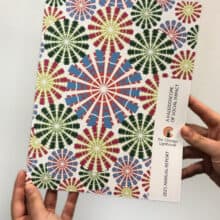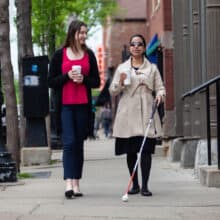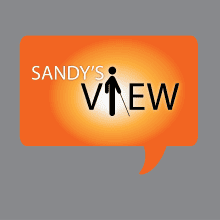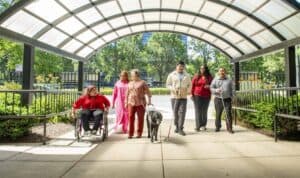Commentary: Why Providing Accessible Information Is the Right Thing to Do
For people who are blind or severely visually impaired, Braille is the equivalent of print letters and numbers to those with sight. Unfortunately, only a small percentage of signs and literature that we interact with on a daily basis are available in Braille. Elevators and bathrooms with Braille signage helps me know I am at the right place when I am out and about. In the rare instance I come across a restaurant with Braille menus, I feel a sense of independence because I can read the different choices on my own. Braille not only allows me to read and write, it also helps me be more independent.
Recently, police officers in Ottawa, Canada began wearing laminated Braille badges so that they can be easily identified by residents with vision loss. The badges list the officer’s rank and main police phone number on a Braille overlay. According to the Ottawa Police Department, this initiative was not generated by an incident or public push. Instead, the idea came to them after seeing a presentation by members of the blind and visually impaired community. Thanks to these Braille badges, those with vision loss will be able to confirm that the person they are interacting with is, in fact, a police officer.
To me, this is a great step in the right direction for accessibility and inclusion. The reality is that as people with vision loss, many of us are at a disadvantage when interacting with public officials. Unless we recognize their voice or they identify themselves to us, we might not know if someone is truly a police officer or other authority. Although I realize that some people who are blind might prefer not to examine these badges (they might be uncomfortable or feel strange asking an officer for their badge), it is great to know this option is available, in case it is ever needed.
More businesses and public authorities should follow in these steps by providing accessible information to people who cannot see. Places like restaurants, banks, doctors’ offices and the like should have their literature in alternative formats. Having menus, forms, brochures, etc. in Braille, audio or electronic formats would give us more access to information. It would also greatly enhance the independence of people who are blind or visually impaired in public places.

Sandy Murillo works at The Chicago Lighthouse, an organization serving the blind and visually impaired. She is the author of Sandy’s View, a bi-weekly Lighthouse blog about blindness and low vision. The blog covers topics of interest to those living with blindness and vision impairments. Being a blind journalist and blogger herself, Sandy shares her unique perspective about ways to live and cope with vision loss.





